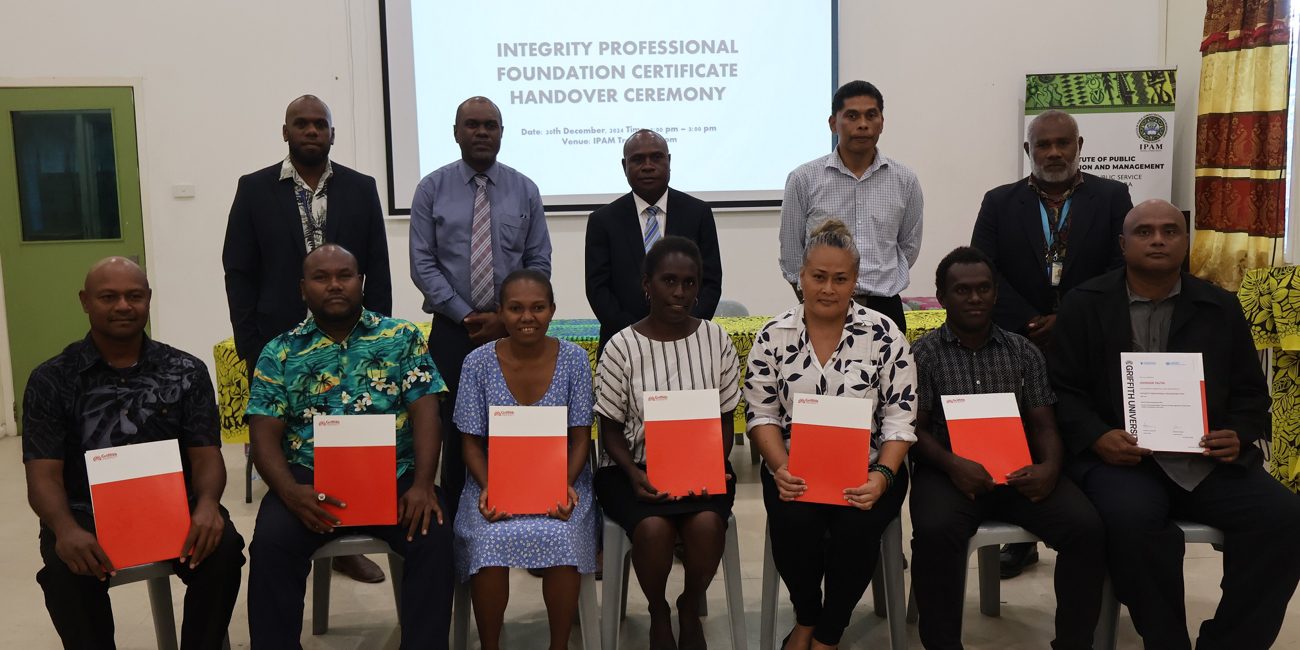SOLOMON Islands integrity institutions hosted a certificate handing-over ceremony to honor the inaugural participants of the Integrity Professional Foundations Course.
This noteworthy initiative, offered by Griffith University and supported by the United Nations Office on Drugs and Crime (UNODC) in Papua New Guinea, was conducted in collaboration with Solomon Islands Office of the Prime Minister and Cabinet’s Policy and Programme Unit.
The handing over ceremony was convened on 20 December 2024.
This specialised course has been designed to provide foundational knowledge and skills to early-career integrity professionals as well as seasoned individuals transitioning into integrity roles within government agencies.
Participants gained critical insights into their organisational functions, operational requirements and the legal, political and policy contexts relevant to their work.
Director General of the Solomon Islands Independent Commission Against Corruption (SIICAC), John Kouni delivered an impactful keynote address emphasising the vital role of integrity and accountability within public service.
Mr Kouni highlighted that among the certificate recipients, nine individuals represented various integrity and accountability institutions, while two were dedicated staff members from Transparency Solomon Islands International.
“This event marks a significant milestone in our ongoing efforts to cultivate a culture of integrity and good governance throughout our nation,” said Kouni. He acknowledged the collaborative efforts of numerous organisations and individuals whose commitment has made the Integrity Professional Foundations Course a reality.
“Today symbolises a pivotal moment in your professional journey as you are recognized for successfully completing this six-month training course. Your accomplishment not only reflects your dedication but also serves as a beacon of hope for the future of our institutions,” Mr Kouni stated.
Mr Kouni stressed the relevance of the course in addressing the pressing integrity challenges faced within the public service sector.
He reinforced the necessity of collaboration between civil society organisations and government integrity institutions, underscoring their collective mission to combat corruption and promote transparency across the nation.
“As you receive your certificates today, remember that this is not just recognition of your hard work but also a responsibility to uphold the principles of integrity.”
Mr Kouni encouraged them to become change-makers in their communities, embodying the values of service, integrity and leadership.
Assistant Secretary of Policy and Programmes in the Office at the Prime Minister and Cabinet (OPMC), Philip Manakako Jr expressed immense pride in the achievements of the course participants.
He reaffirmed the event’s significance as a historic initiative under the National Anti-Corruption Strategy 2024-2027, reflecting the government’s unwavering dedication to fostering integrity and good governance.
“This ceremony represents a significant milestone and a pioneering effort under our National Anti-Corruption Strategy, demonstrating our resolute commitment to combat corruption and promote good governance,” Mr Manakako Jr stated.
He also shared the overwhelmingly positive feedback from Griffith University and the programme sponsors, commending the participants for their dedication and hard work.
Mr Manakako Jr announced plans for discussions with the UNODC to expand the programme to participants from other countries in the region, positioning the Solomon Islands as a leader in regional integrity initiatives.
“These initiatives aim to enhance the capacity of enforcement agencies and accountability institutions to effectively address investigative and preventive efforts,” he added.
As part of enhancing these efforts, discussions are currently underway with the Police Academy to develop an anti-corruption investigative manual that will strengthen training capabilities for law enforcement professionals in alignment with international standards.
Also speaking during the handover ceremony, Deputy Secretary for Government Public Management in the Ministry of Public Service, Ian Rakafia congratulated the officers on reaching this significant milestone.
He articulated the crucial nature of accountability and good governance in today’s world and praised the course’s completion as a courageous step toward thriving amidst challenges.
Mr Rakafia also highlighted a recent agreement signed between the Solomon Islands Public Service and the Australian Public Service, which aims to enhance workforce skills, address specific needs, and empower effective governance practices.
Course participant representative and Principal Investigation Officer at the Leadership Code Commission, Tarissa Bula, reflected on the informative nature of the course, which included travel to Australia and PNG this year.
She emphasised that the training has equipped participants to tackle integrity issues and combat corruption in both public and private sectors.
While acknowledging the challenges inherent in fighting corruption, Ms Bula expressed a renewed belief in their collective efforts to minimize and deter such practices within the workforce.
With photos in folder
- Nine officers from integrity institutions in the country who completed a six-month Integrity Professional Foundation Course posing with key guest speakers during the certificate handover ceremony on December 20at Griffith University, with support from the United Nations Office on Drugs and Crime (UNODC) in PNG, conducted this noteworthy initiative in collaboration with the Office of the Prime Minister’s Policy and Programme Unit
- Discussions are underway to develop an Anti-Corruption Investigative Manual that will strengthen training capabilities for law enforcement professionals in alignment with international standards
- The participants reflected on the informative nature of the course, which included travel to Australia and PNG last year. They acknowledged the challenges inherent in fighting corruption, and expressed a renewed belief in their collective efforts to minimise and deter such practices within the workforce
– GCU









